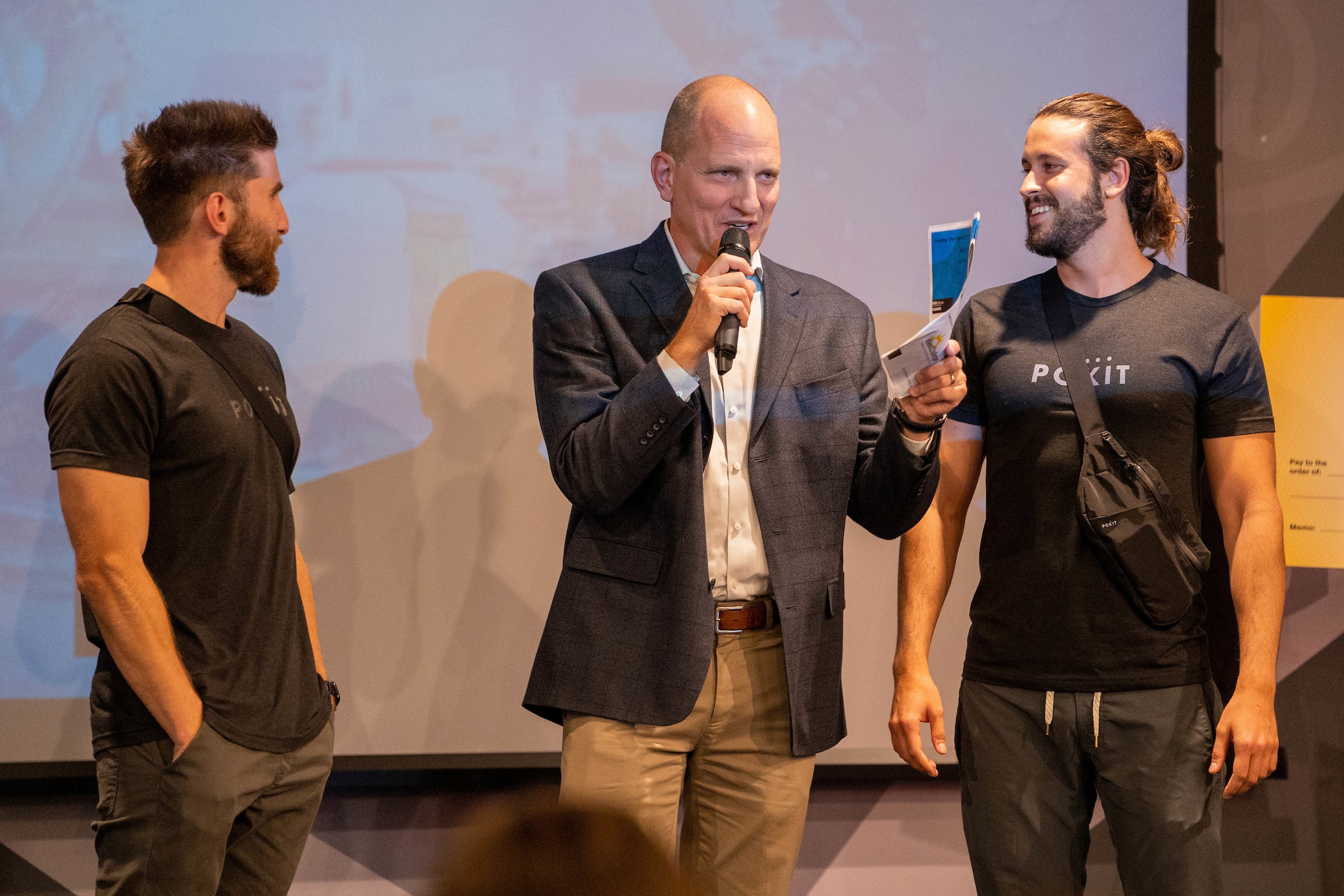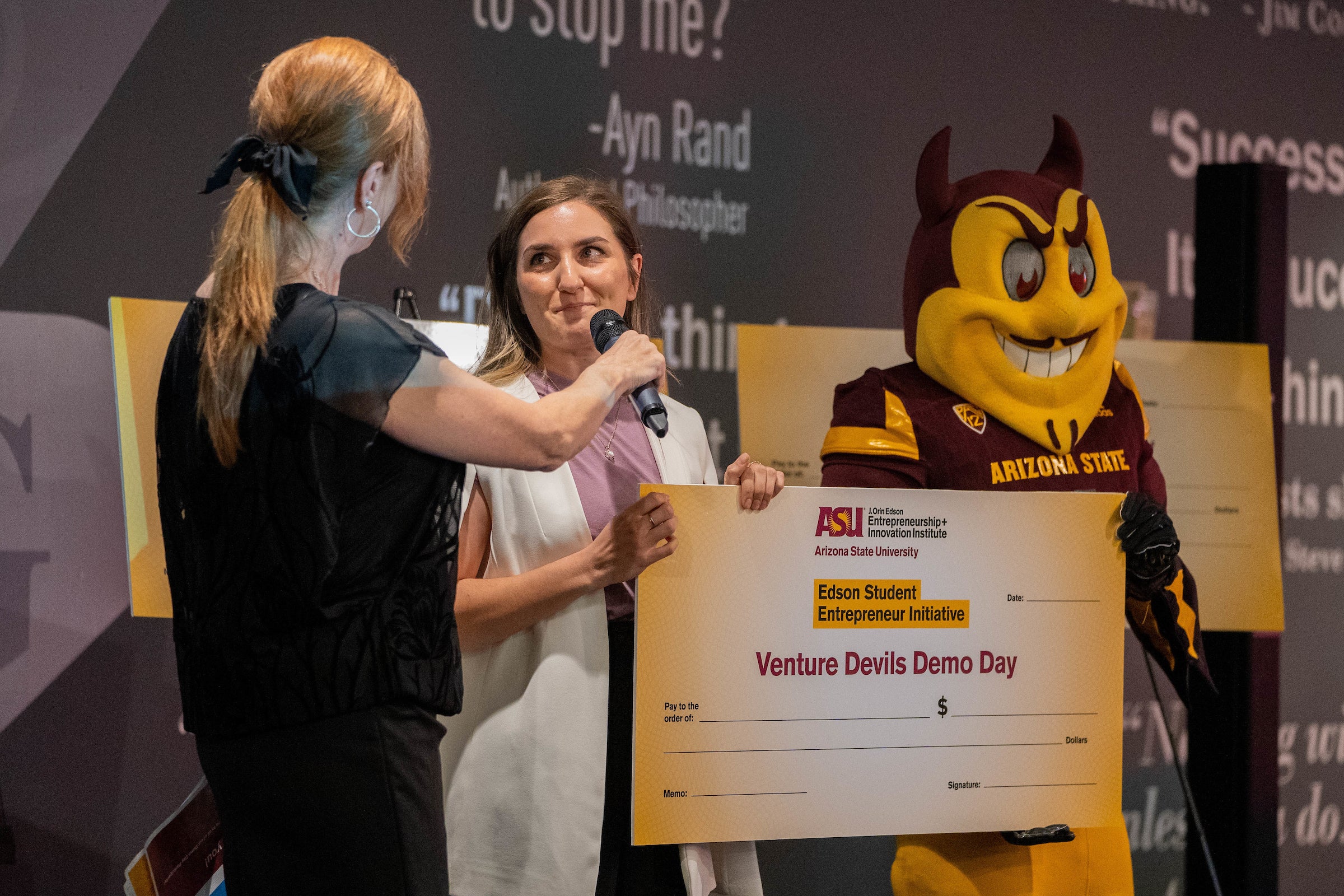Sixteen-year-old Avi Agarwal asked a panel of seasoned entrepreneurs for $1,000. Instead, he received $5,000.
The idea that made them want to give more? Edible cupcake liners.
Agarwal was one of 75 participants who call themselves Venture Devils, a program to support Arizona State University students, staff, faculty and community entrepreneurs run by the J. Orin Edson Entrepreneurship + Innovation Institute. On April 29, they vied to earn seed funding for innovative solutions during the Demo Day competition at SkySong, the ASU Scottsdale Innovation Center.
“I’m the type of person that believes in taking things step by step, and only ask for what I believe is absolutely necessary right now,” said the owner of Avi’s Sweet Treats, a 501(c)(3) nonprofit bakery that sells and donates cupcakes for charity. “I figure I could always ask for more money later on.”
But the BASIS Peoria high school junior and youngest member in the competition didn’t have to ask for more. Judges for the Edson Social Impact Venture Challenge liked his five-minute pitch so much they gave him an extra $4,000 for his venture, which has baked around 10,000 cupcakes, raised funds for 24,500 meals and raised $5,000 for other causes.
And now, it’ll also help protect the environment, because every cupcake he makes means there’s no liner to toss in the garbage.
Demo Day is held at the end of every semester, and Friday’s pitch and awards event was the culmination of a daylong showcase of ideas that ranged from festival-style fashions to an app for team building to an alternative caffeine drink. This year, $280,000 – the highest in the competition’s history – was awarded in eight funding tracksThe eight funding tracks this spring were: Edson Social Impact Venture Challenge; Edson Student Entrepreneur Initiative; eSeed Challenge; Mastercard Foundation Scholars; Norling Family Venture Challenge; Sarsam Family Venture Challenge; Sun Devil Athletics Challenge; and Venture Vets, sponsored by Follet.. Venture Devils teams also get access to personalized mentorship, curated resources and collaboration spaces.
“One of the most thrilling aspects of Venture Devils Demo Day lies in witnessing the founders prepare to deliver their pitch, with our Venture Mentors cheering them on, the nervousness, the exhilaration, the camaraderie that fills the day with immense energy reflective of the hard work, perseverance and dedication to advance their venture,” said Tracy Lea, director of venture development with the J. Orin Edson Entrepreneurship + Innovation Institute. “For many, this is the first time they feel heard and (have) their ideas validated in a public forum; whether they are awarded funding or not, the connectivity inspires us all. We nurture an environment where ideas flourish.”
Many ideas flourished during the pandemic, including POKIT, a crossbody sling that wirelessly charges smartphones while on the go.
“Me and my business partner were working with wireless chargers and we realized there was a need between mobile charging and wireless charging,” said Tanner Wills, a Los Angeles-based industrial designer and 2016 graduate of the Herberger Institute for Design and the Arts who co-founded the company with his partner, Tyler Johnson, also a 2016 alum of ASU. “We saw there was a trend with crossbody bags, and we suddenly connected the dots. We integrated the two ideas seamlessly by putting the phone in the pocket, (which) wirelessly aligns and charges.”
POKIT COO Tyler Johnson (left) and CEO Tanner Wills (right) are awarded $10,000 for their startup at Venture Devils Demo Day. POKIT is a crossbody sling bag that wirelessly charges smartphones. Photo by Samantha Chow/ASU
Johnson said they started the idea in 2019 but used the pandemic to their advantage.
“As much as COVID-19 was hard on everyone, it helped us refine the concept and idea,” said Johnson, who graduated from the Ira A. Fulton Schools of Engineering. “It gave us the longevity of time and the ability to not have to rush to market.”
POKIT has been on the market for nearly four months and is a direct-to-consumer purchase. It includes a bag, a removeable battery and recharging cable, and retails for $98.
The $10,000 in award money came from the Sarsam Family Venture Challenge and, according to Johnson, will go toward “market share and expanding operations.”
Not all of the pitches were strictly for profit. Entrepreneurship is about solving problems, including societal. The Edson Social Impact Venture Challenge devoted $45,000 in funding to ventures that address recycling, sustainability, health, agricultural waste, malaria prevention and water conservation.
The latter is a growing concern in Arizona, which is why Riviulet, a water conservation service, was awarded $20,000.
Riviulet is an in-person water efficiency check-up service that specifically focuses on leaks inside homes and irrigation systems outside the residence. They then make customized recommendations on how customers can save money on water usage.
Its founder, Ioana Ruluca Mihalcescu, originally hails from Romania but grew up in Alaska, which made her “super passionate about protecting the planet.” She said that while California, Nevada and New Mexico have robust water conservation programs, Arizona is sorely lacking.
“It’s baffling to me that no one really talks about water conservation, especially in Arizona,” said Mihalcescu, a graduate student in ASU’s Innovation Venture Development program. “I want to be a part of securing Arizona’s future for generations to come.”
Innovation and venture development gradaute student Ioana Raluca Mihalcescu is awarded $20,000 for her startup Riviulet at Venture Devils Demo Day. The startup aims to reduce Arizona’s water usage. Photo by Samantha Chow/ASU
Demo Day isn’t focused solely on the United States. Venture Devils in the Mastercard Foundation Scholars track take their innovations back to their home countries in Africa, in an attempt to improve their daily lives. Some of them will tackle issues such as eco-friendly recycling, securing educational scholarships, low-cost rehabilitation services and improving computer skills for secondary students.
Even the sports world got some innovation dust from entreprenuers. The Sun Devil Athletics Venture Challenge was a separate event that took place earlier in the week, and is considered an important strategic partner with Demo Day in spring competitions. Timeout developed an app that addresses the future of mental health care delivery for college athletes and received $20,000 while VBAmerica, a volleyball lifestyle clothing brand, was awarded $5,000.
Jim Norling Jr., who sponsored the first-time Norling Family Venture Challenge, came away from Demo Day wholly impressed.
“This is our first experience with Demo Day and it exceeded our expectations in every way,” Norling said.
Other funding winners were:
Edson Social Impact Venture Challenge: Philanthrofi, $20,000; Omnivor, $15,000; and Oradeza, Inc., $5,000.
Edson Student Entrepreneur Initiative: Pool Up and Kogo, $20,000 each; Everywhere Machine, $15,000; Quantanx, $10,000; Bojuf Solutions, BrainPowerJam, CarboHarvest, Fashion Morph by Vivative LLC, Huzzle, LLC and Malaria Prevention Kit, $3,000 each.
eSeed Challenge: Yum Man! and Zen Shuttles, $8,000 each; Hairtage, Rook’s Chess Club and VB America, $3,000 each.
Mastercard Foundation Scholars: Godsway’s Agri House Limited, $6,000; Comprehensive Rehabilitative Services, $4,000; Cocoa Potash, $3,500; Education for All.cd, $3,000; ZUNUO FARMS LIMITED, $2,000; HYPE Initiative and Vuka Logistics, $1,500 each; PeculiarAl, $1,000; PAQ, Rezin, Skideo, SnackHealthy and Trivsel Pad, $500 each.
Norling Family Venture Challenge: ScripGuard, $10,000; IWaandr, MagStee Medicals and WaitLess Medical, $5,000 each.
Sarsam Family Venture Challenge: Get Gifted Inc., $5,000; Crisp U.S. Thrift, $3,000; SYMBOL, $2,000.
Sun Devil Athletics Challenge: Timeout, $20,000; VO2, $10,000, VB America, $5,000.
Venture Vets sponsored by Follet: NeurodiVR and Téo Cacao, $5,000 each.
Top photo: Avi Agarwal received $5,000 for his startup Avi's Sweet Treats, which is a 501(c)(3) nonprofit bakery that sells and donates cupcakes for charity. Agarwal is a junior at BASIS Peoria and won the investment at Demo Day, held Friday at SkySong, sponsored by the J. Orin Edson Entrepreneurship + Innovation Institute at ASU. Photo by Samantha Chow/ASU
More Science and technology

Breakthrough copper alloy achieves unprecedented high-temperature performance
A team of researchers from Arizona State University, the U.S. Army Research Laboratory, Lehigh University and Louisiana State University has developed a groundbreaking high-temperature copper alloy…

4 ASU researchers named senior members of the National Academy of Inventors
The National Academy of Inventors recently named four Arizona State University researchers as senior members to the prestigious organization.Professor Qiang Chen and associate professors Matthew…

Transforming Arizona’s highways for a smoother drive
Imagine you’re driving down a smooth stretch of road. Your tires have firm traction. There are no potholes you need to swerve to avoid. Your suspension feels responsive. You’re relaxed and focused on…




